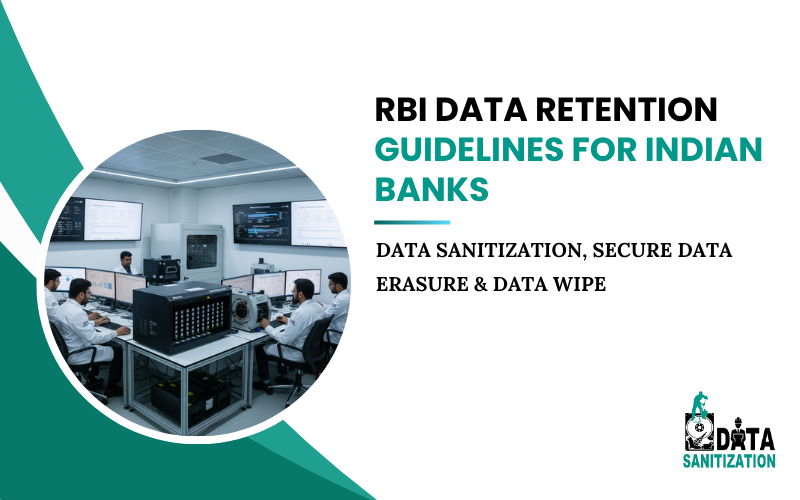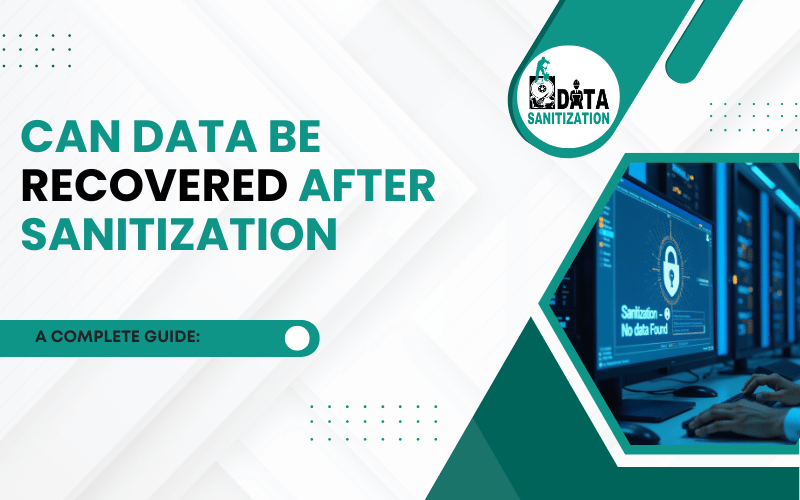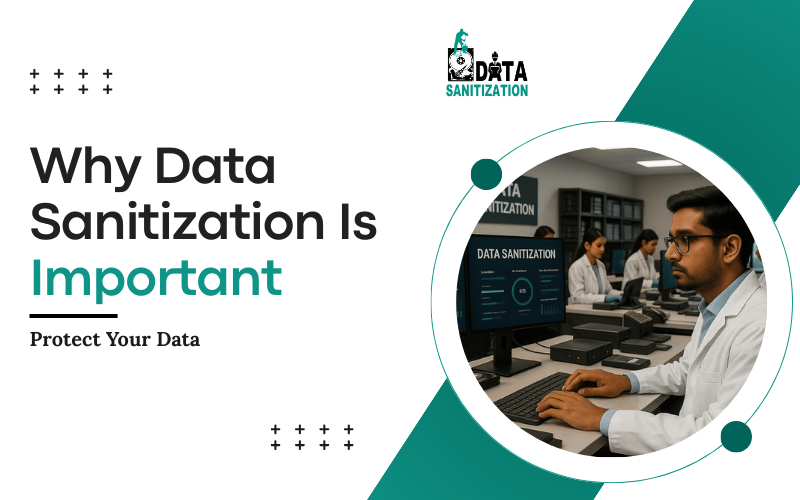In the era of digital transformation, data security is a critical challenge faced by Indian banks and financial institutions. Handling sensitive customer information demands rigorous data retention, data sanitization, and secure data destruction protocols to ensure compliance with the Reserve Bank of India’s (RBI) regulatory framework.

With cyber threats evolving rapidly, banks must adopt comprehensive strategies to safeguard customer data privacy and adhere to RBI’s data retention guidelines and India’s latest Digital Personal Data Protection Act (DPDP) 2023. This includes implementing best practices for data erasure, data wipe, and media sanitization to prevent data breaches, insider threats, and regulatory penalties.
This blog provides an in-depth look into RBI’s expectations for Indian banks regarding data retention, secure data sanitization techniques, compliance requirements, and the importance of certified data destruction in today’s banking environment.
 What Are RBI Data Retention Guidelines? Understanding Compliance for Indian Banks
What Are RBI Data Retention Guidelines? Understanding Compliance for Indian Banks

RBI data retention guidelines define the minimum period banks must retain different categories of data, including KYC documents, transaction logs, communication records, and audit trails. These guidelines ensure data availability for regulatory audits, fraud investigations, and legal disputes, while balancing the need to protect customer privacy.
 Key Objectives of RBI Data Retention Policies
Key Objectives of RBI Data Retention Policies




 RBI Mandated Data Retention Periods: Essential Timelines
RBI Mandated Data Retention Periods: Essential Timelines
Data Type | RBI Retention Period | Regulatory Source/Notes |
KYC Documents | Minimum 5 years post-account closure | RBI Master Directions on KYC |
Transaction Records | Minimum 8 years | RBI Cybersecurity Framework & IT Guidelines |
Audit Logs and Trails | At least 10 years | RBI Internal Controls and IT Audit norms |
Customer Correspondence | 5 to 8 years | RBI Circulars & Compliance Requirements |
Banks must strictly follow these retention schedules while ensuring secure storage and timely data sanitization or data destruction after expiry.
 The Critical Role of Data Sanitization and Secure Data Destruction
The Critical Role of Data Sanitization and Secure Data Destruction
RBI’s regulatory ecosystem emphasizes not only retaining data securely but also securely erasing or sanitizing data once the retention period lapses or when customer consent is withdrawn, as mandated by the DPDP Act 2023.

Data sanitization refers to the process of irreversibly removing sensitive information from storage media, making it unrecoverable by any means, including forensic recovery.
 Why Secure Data Erasure Is Vital for Indian Banks
Why Secure Data Erasure Is Vital for Indian Banks




 Best Practices for RBI-Compliant Data Retention, Data Sanitization & Data Destruction
Best Practices for RBI-Compliant Data Retention, Data Sanitization & Data Destruction

 1. Implement a Comprehensive Data Retention Policy
1. Implement a Comprehensive Data Retention Policy



 2. Adopt Certified Data Sanitization Methods
2. Adopt Certified Data Sanitization Methods
Use industry-leading and RBI-approved data wipe and data erasure solutions that conform to international standards such as:







 3. Maintain Detailed Audit Trails and Compliance Documentation
3. Maintain Detailed Audit Trails and Compliance Documentation



 4. Regularly Train Bank Employees
4. Regularly Train Bank Employees


 5. Monitor Regulatory Updates and Upgrade Practices
5. Monitor Regulatory Updates and Upgrade Practices


 Challenges Faced by Indian Banks in Data Retention and Secure Data Wipe
Challenges Faced by Indian Banks in Data Retention and Secure Data Wipe





 How Data Sanitization Can Help Indian Banks Stay RBI-Compliant
How Data Sanitization Can Help Indian Banks Stay RBI-Compliant
At Data Sanitization, we specialize in providing end-to-end data destruction and sanitization services tailored for Indian banks and financial institutions. Our services include:





Our expert team ensures your institution minimizes regulatory risks, protects customer data privacy, and maintains the highest cybersecurity standards.
 Conclusion
Conclusion
Indian banks face increasing pressure to safeguard sensitive data while complying with stringent RBI data retention guidelines and India’s evolving data protection laws. Effective data sanitization, secure data erasure, and data wipe protocols are essential components of a robust compliance strategy.
By adopting certified destruction technologies, maintaining transparent audit trails, and continuously updating compliance frameworks, banks can protect their customers, enhance trust, and avoid costly penalties.
To ensure your bank is fully compliant with RBI’s data retention and destruction requirements, partner with trusted experts like Data Sanitization—your reliable source for secure, certified, and compliant data sanitization solutions in India.

Data Sanitization



For consultations on RBI-compliant data sanitization, secure data destruction, and comprehensive data wipe solutions, contact us today.
Need Onsite Data Sanitization Services?
Do you want Data Sanitization Services to be provided at your location? No worries!! We got it covered. Our team members will be appointed to finish the job at your location after you book the appointment with us. Please feel free to contact us.





